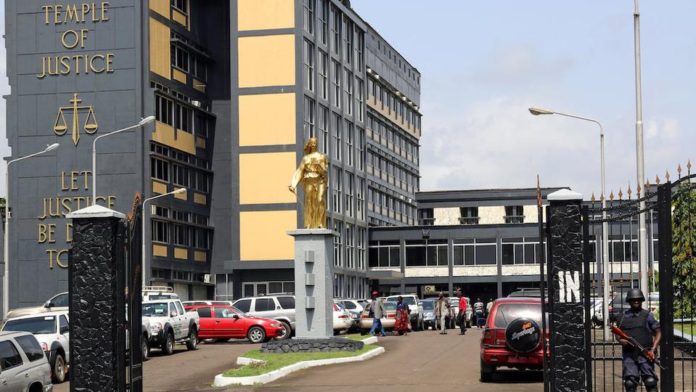Several Judges of the Judiciary have filed a lawsuit against the Government of Liberia for what they described as the “wrongful and illegal abolition and withholding of their allowances”.
The Judges include Cllr. George W. Smith, Resident Circuit Judge, fifteen Judicial
Circuit, River Gee County, Cllr.Osman F. Feika, resident Circuit judge, fifth judicial circuit, Grand Cape Mount County, Cllr. Peter W. Gbenewelleh, Resident circuit judge, Twelveth judicial circuit, Grant Kru County, Cllr. George S. Wiles, Jr. Resident circuit judge, seventh judicial circuit, Grand Gedeh County, Cllr. Roland Dahn, resident Circuit judge, Eighth judicial circuit,Nimba County.
Other include Cllr. Joe S. Barkon, resident Circuit judge, second circuit, Grand, Bassa County, Cllr. Zuballah A. Kizeku, resident Circuit judge, sixteenth judicial circuit, Gbarpolu County, Cllr. D. Onesiumus Banwon, resident Circuit judge, Fourteenth judicial circuit, Rivercess County, Cllr. T. Ciapha Carey, eleventh judicial circuit, Bomi County, Cllr. Koiboi K. Nuta, resident Circuit judge and first judicial circuit, Criminal Assizes “B”, Montserrado County, Cllr. Henry Nagbe amongst others.
The Judges in an action for wrong lawsuit filed before J. Kennedy Peabody, Resident Circuit judge of Civil Law Court at the Temple of Justice said that prior to enactment of the National Remuneration Standardization Act of 2019, they were each paid monthly remunerations as follows; salary L$22,950 taxable, allowance US$5,000 non-taxable, and gasoline 350 gallons but later reduced to 135 gallons.
The Liberian judges also say that upon coming into effect of the National Remuneration Standardization Act of 2019, they were are being paid and continue to be paid the following remunerations; salary US$5,000 taxable, allowance is abolished and gasoline 135 gallons.
They explained that the National Legislature passed “an act to establish the National Remunerations Standardization of 2019” for the purpose of harmonizing salaries, allowances and benefits of all public officials and employees including civil servants and to reduce or increase such Remunerations to the extent possible.
The said act placed judges of subordinate courts along with ministers in the Executive branch, the Chief of Staff of Armed Forces of Liberia, the court administrator of the Supreme Court of Liberia, the chief clerk of the House of Representatives and secretary of the Senate in category 3 for remuneration.
That Article 72 (a) of the 1986 Constitution of Liberia provides that the justices of the Supreme Court of Liberia and all other judges shall receive salary, allowances and benefits as shall be established by law.
It stated that such salaries shall be subject to taxes as defined by law, provided that they shall not otherwise be diminished.
They argued that allowances and benefits pay to justices of the Supreme Court of Liberia and judges of subordinate courts may by law be increased but may not be diminished except under a nation program enacted by the Legislature, nor shall such allowances and benefits be subject to taxes.
Section 13.4(2) (1) of the New Judiciary law provides that the salaries of justices, judges and stipendiary Magistrates shall be fix by statute and shall be provided by annual budgetary appropriation.
“The salary to be provided to the Chief Justice of the Supreme Court shall be the same as that of the Vice President. Further, section 13.4 (2) (2) of the New Judiciary law provides that compensation of justices, judges of Magistrates shall not be reduce during the tenure at which he was appointed,” the judges stated.
They noted that part III, section 1 (c) of the National Remuneration Standardization Act of 2019 placing them in the same category with ministers, chief of staff undermines judicial Independence and therefore unconstitutional.
The abolition of the payment of allowances to petitioners and all judicial officers similarly situated unconstitutional and all judicial officers are entitled to payment of allowances retroactive as the date of the coming into effect off the 2019 Act.
The salary harmonization process in Liberia has been criticized by many critics of the Weah’s administration as many civil servants are unable to carter to their living expense due to massive deduction into their allowances.























Comments are closed.